Entrepreneurial Ventures, Economic Impact, and Entrepreneurial Traits
VerifiedAdded on 2020/11/23
|14
|3959
|148
Report
AI Summary
This report provides a comprehensive overview of entrepreneurship and small business management. It begins by defining entrepreneurship and exploring various types of entrepreneurial ventures, including small business, large company, scalable business, and social entrepreneurship, along with their relation to different entrepreneurship typologies. The report then delves into the similarities and differences among these ventures, highlighting aspects like organizational structure and economic motives. Furthermore, it analyzes the significant impact of micro and small enterprises on the UK economy, emphasizing their contribution to employment, revenue generation, and innovation. The report also discusses the importance of small businesses in fostering social economic growth, particularly in terms of job creation and regional development. Finally, it examines the traits and skills of successful entrepreneurs, differentiating them from traditional managers and assessing the influence of entrepreneurial personality and background on motivation and mindset.

ENTREPRENEURSHIP
AND SMALL BUSINESS
MANAGEMENT
AND SMALL BUSINESS
MANAGEMENT
Paraphrase This Document
Need a fresh take? Get an instant paraphrase of this document with our AI Paraphraser

Table of Contents
INTRODUCTION...........................................................................................................................1
LO 1.................................................................................................................................................1
P1 Various types entrepreneurial business and their relation with entrepreneurship typologies 1
P2 Similarities & Differences among entrepreneurial ventures..................................................3
LO 2.................................................................................................................................................4
P3 Impact of micro & small enterprises on economy..................................................................4
P4 Importance of Small business enterprises in growth of social economy................................6
LO 3.................................................................................................................................................7
P5 Traits & skills used by successful entrepreneur which differentiate them for other managers
......................................................................................................................................................7
P6 Reflection of entrepreneurial personality on entrepreneurial motivation and mindset..........7
LO 4.................................................................................................................................................8
P7 Background of Entrepreneur...................................................................................................8
CONCLUSION................................................................................................................................9
REFERENCES..............................................................................................................................10
INTRODUCTION...........................................................................................................................1
LO 1.................................................................................................................................................1
P1 Various types entrepreneurial business and their relation with entrepreneurship typologies 1
P2 Similarities & Differences among entrepreneurial ventures..................................................3
LO 2.................................................................................................................................................4
P3 Impact of micro & small enterprises on economy..................................................................4
P4 Importance of Small business enterprises in growth of social economy................................6
LO 3.................................................................................................................................................7
P5 Traits & skills used by successful entrepreneur which differentiate them for other managers
......................................................................................................................................................7
P6 Reflection of entrepreneurial personality on entrepreneurial motivation and mindset..........7
LO 4.................................................................................................................................................8
P7 Background of Entrepreneur...................................................................................................8
CONCLUSION................................................................................................................................9
REFERENCES..............................................................................................................................10
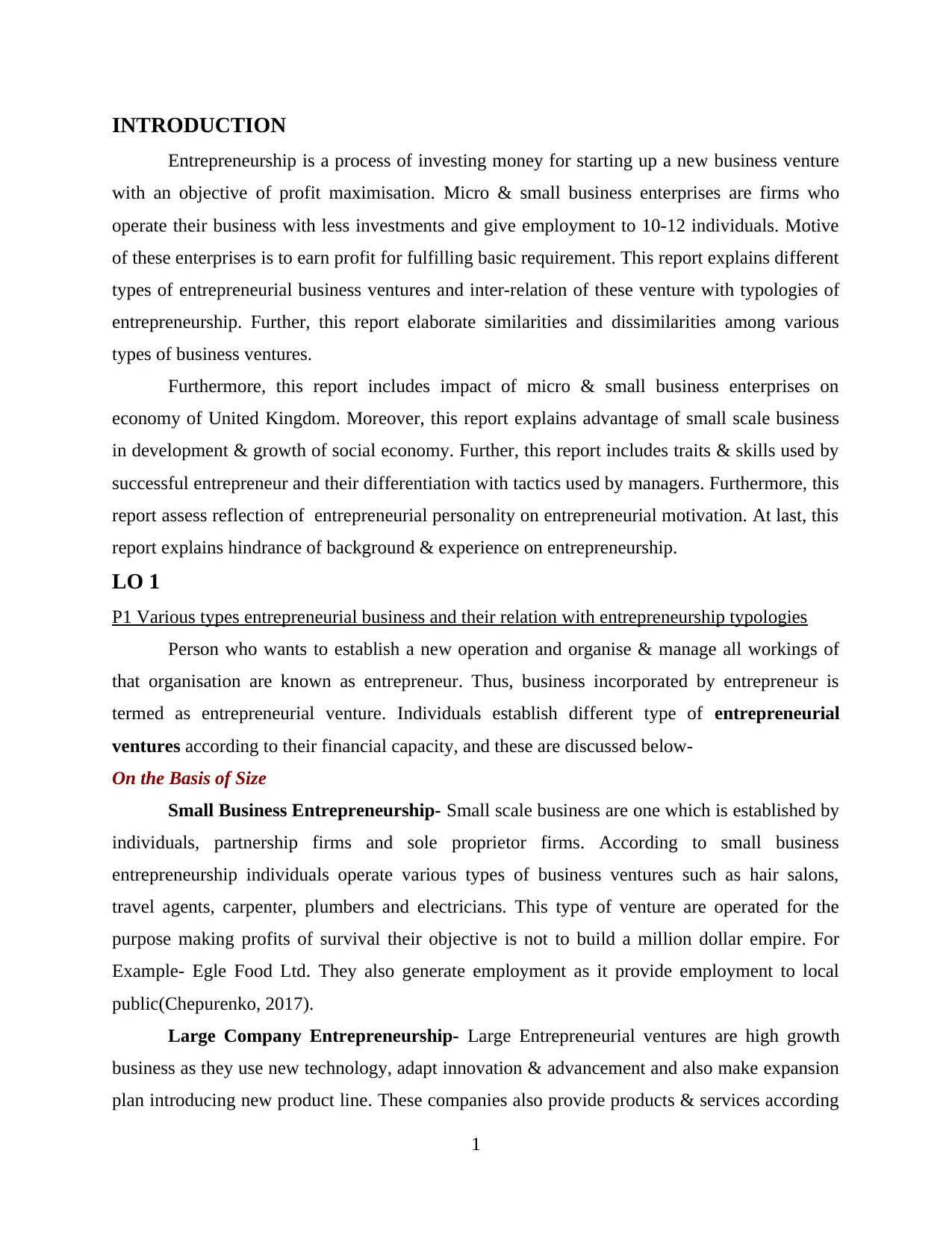
INTRODUCTION
Entrepreneurship is a process of investing money for starting up a new business venture
with an objective of profit maximisation. Micro & small business enterprises are firms who
operate their business with less investments and give employment to 10-12 individuals. Motive
of these enterprises is to earn profit for fulfilling basic requirement. This report explains different
types of entrepreneurial business ventures and inter-relation of these venture with typologies of
entrepreneurship. Further, this report elaborate similarities and dissimilarities among various
types of business ventures.
Furthermore, this report includes impact of micro & small business enterprises on
economy of United Kingdom. Moreover, this report explains advantage of small scale business
in development & growth of social economy. Further, this report includes traits & skills used by
successful entrepreneur and their differentiation with tactics used by managers. Furthermore, this
report assess reflection of entrepreneurial personality on entrepreneurial motivation. At last, this
report explains hindrance of background & experience on entrepreneurship.
LO 1
P1 Various types entrepreneurial business and their relation with entrepreneurship typologies
Person who wants to establish a new operation and organise & manage all workings of
that organisation are known as entrepreneur. Thus, business incorporated by entrepreneur is
termed as entrepreneurial venture. Individuals establish different type of entrepreneurial
ventures according to their financial capacity, and these are discussed below-
On the Basis of Size
Small Business Entrepreneurship- Small scale business are one which is established by
individuals, partnership firms and sole proprietor firms. According to small business
entrepreneurship individuals operate various types of business ventures such as hair salons,
travel agents, carpenter, plumbers and electricians. This type of venture are operated for the
purpose making profits of survival their objective is not to build a million dollar empire. For
Example- Egle Food Ltd. They also generate employment as it provide employment to local
public(Chepurenko, 2017).
Large Company Entrepreneurship- Large Entrepreneurial ventures are high growth
business as they use new technology, adapt innovation & advancement and also make expansion
plan introducing new product line. These companies also provide products & services according
1
Entrepreneurship is a process of investing money for starting up a new business venture
with an objective of profit maximisation. Micro & small business enterprises are firms who
operate their business with less investments and give employment to 10-12 individuals. Motive
of these enterprises is to earn profit for fulfilling basic requirement. This report explains different
types of entrepreneurial business ventures and inter-relation of these venture with typologies of
entrepreneurship. Further, this report elaborate similarities and dissimilarities among various
types of business ventures.
Furthermore, this report includes impact of micro & small business enterprises on
economy of United Kingdom. Moreover, this report explains advantage of small scale business
in development & growth of social economy. Further, this report includes traits & skills used by
successful entrepreneur and their differentiation with tactics used by managers. Furthermore, this
report assess reflection of entrepreneurial personality on entrepreneurial motivation. At last, this
report explains hindrance of background & experience on entrepreneurship.
LO 1
P1 Various types entrepreneurial business and their relation with entrepreneurship typologies
Person who wants to establish a new operation and organise & manage all workings of
that organisation are known as entrepreneur. Thus, business incorporated by entrepreneur is
termed as entrepreneurial venture. Individuals establish different type of entrepreneurial
ventures according to their financial capacity, and these are discussed below-
On the Basis of Size
Small Business Entrepreneurship- Small scale business are one which is established by
individuals, partnership firms and sole proprietor firms. According to small business
entrepreneurship individuals operate various types of business ventures such as hair salons,
travel agents, carpenter, plumbers and electricians. This type of venture are operated for the
purpose making profits of survival their objective is not to build a million dollar empire. For
Example- Egle Food Ltd. They also generate employment as it provide employment to local
public(Chepurenko, 2017).
Large Company Entrepreneurship- Large Entrepreneurial ventures are high growth
business as they use new technology, adapt innovation & advancement and also make expansion
plan introducing new product line. These companies also provide products & services according
1
⊘ This is a preview!⊘
Do you want full access?
Subscribe today to unlock all pages.

Trusted by 1+ million students worldwide
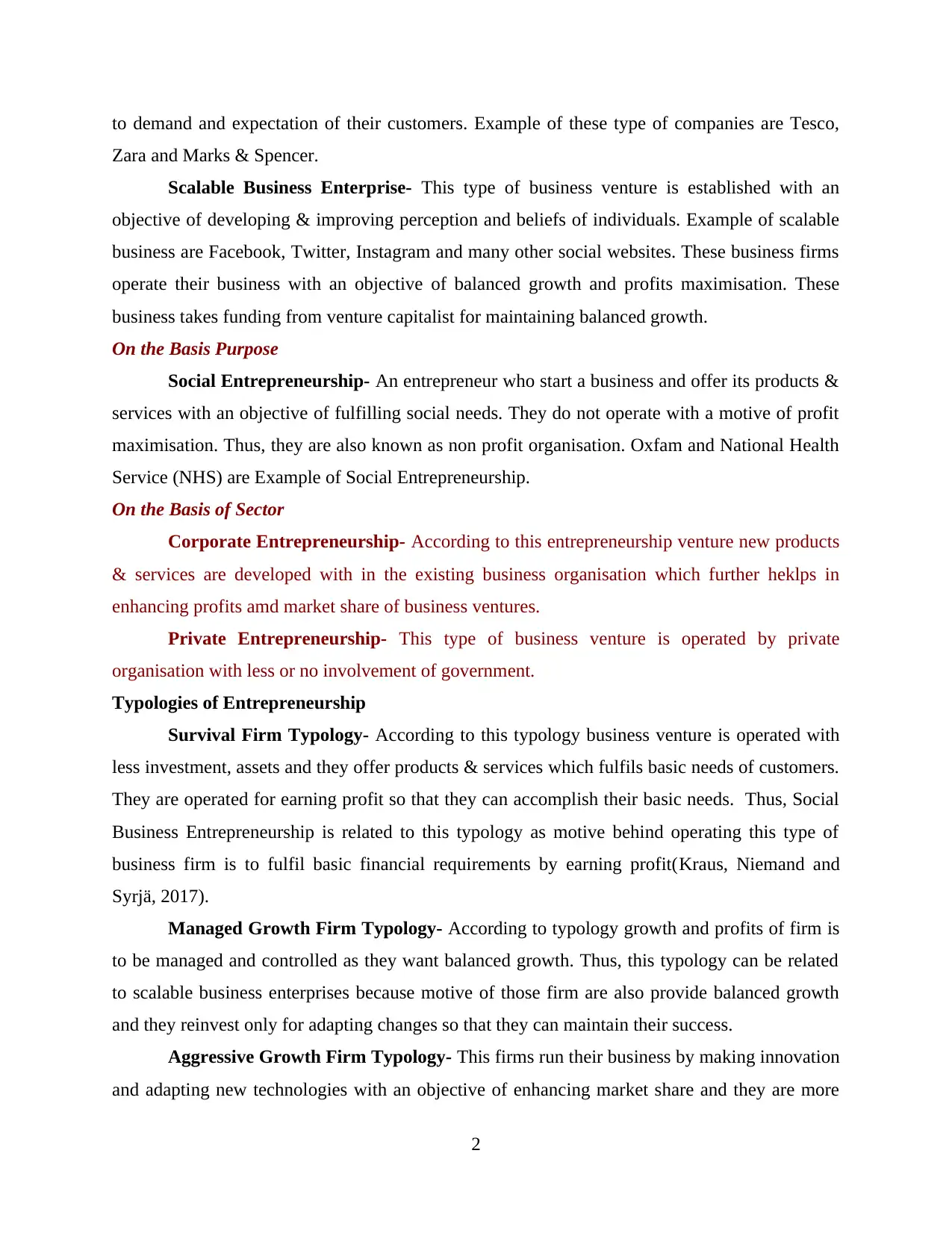
to demand and expectation of their customers. Example of these type of companies are Tesco,
Zara and Marks & Spencer.
Scalable Business Enterprise- This type of business venture is established with an
objective of developing & improving perception and beliefs of individuals. Example of scalable
business are Facebook, Twitter, Instagram and many other social websites. These business firms
operate their business with an objective of balanced growth and profits maximisation. These
business takes funding from venture capitalist for maintaining balanced growth.
On the Basis Purpose
Social Entrepreneurship- An entrepreneur who start a business and offer its products &
services with an objective of fulfilling social needs. They do not operate with a motive of profit
maximisation. Thus, they are also known as non profit organisation. Oxfam and National Health
Service (NHS) are Example of Social Entrepreneurship.
On the Basis of Sector
Corporate Entrepreneurship- According to this entrepreneurship venture new products
& services are developed with in the existing business organisation which further heklps in
enhancing profits amd market share of business ventures.
Private Entrepreneurship- This type of business venture is operated by private
organisation with less or no involvement of government.
Typologies of Entrepreneurship
Survival Firm Typology- According to this typology business venture is operated with
less investment, assets and they offer products & services which fulfils basic needs of customers.
They are operated for earning profit so that they can accomplish their basic needs. Thus, Social
Business Entrepreneurship is related to this typology as motive behind operating this type of
business firm is to fulfil basic financial requirements by earning profit(Kraus, Niemand and
Syrjä, 2017).
Managed Growth Firm Typology- According to typology growth and profits of firm is
to be managed and controlled as they want balanced growth. Thus, this typology can be related
to scalable business enterprises because motive of those firm are also provide balanced growth
and they reinvest only for adapting changes so that they can maintain their success.
Aggressive Growth Firm Typology- This firms run their business by making innovation
and adapting new technologies with an objective of enhancing market share and they are more
2
Zara and Marks & Spencer.
Scalable Business Enterprise- This type of business venture is established with an
objective of developing & improving perception and beliefs of individuals. Example of scalable
business are Facebook, Twitter, Instagram and many other social websites. These business firms
operate their business with an objective of balanced growth and profits maximisation. These
business takes funding from venture capitalist for maintaining balanced growth.
On the Basis Purpose
Social Entrepreneurship- An entrepreneur who start a business and offer its products &
services with an objective of fulfilling social needs. They do not operate with a motive of profit
maximisation. Thus, they are also known as non profit organisation. Oxfam and National Health
Service (NHS) are Example of Social Entrepreneurship.
On the Basis of Sector
Corporate Entrepreneurship- According to this entrepreneurship venture new products
& services are developed with in the existing business organisation which further heklps in
enhancing profits amd market share of business ventures.
Private Entrepreneurship- This type of business venture is operated by private
organisation with less or no involvement of government.
Typologies of Entrepreneurship
Survival Firm Typology- According to this typology business venture is operated with
less investment, assets and they offer products & services which fulfils basic needs of customers.
They are operated for earning profit so that they can accomplish their basic needs. Thus, Social
Business Entrepreneurship is related to this typology as motive behind operating this type of
business firm is to fulfil basic financial requirements by earning profit(Kraus, Niemand and
Syrjä, 2017).
Managed Growth Firm Typology- According to typology growth and profits of firm is
to be managed and controlled as they want balanced growth. Thus, this typology can be related
to scalable business enterprises because motive of those firm are also provide balanced growth
and they reinvest only for adapting changes so that they can maintain their success.
Aggressive Growth Firm Typology- This firms run their business by making innovation
and adapting new technologies with an objective of enhancing market share and they are more
2
Paraphrase This Document
Need a fresh take? Get an instant paraphrase of this document with our AI Paraphraser
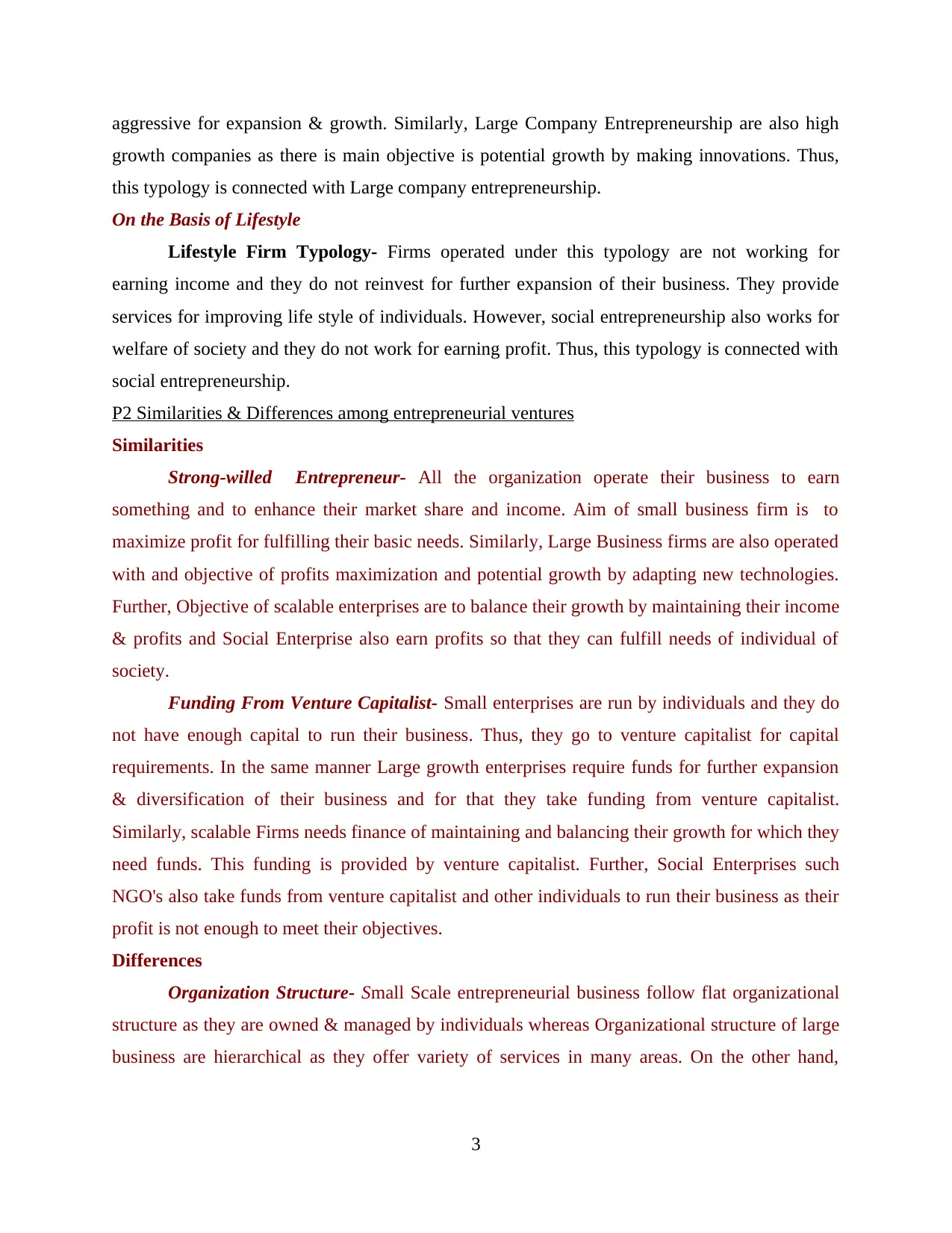
aggressive for expansion & growth. Similarly, Large Company Entrepreneurship are also high
growth companies as there is main objective is potential growth by making innovations. Thus,
this typology is connected with Large company entrepreneurship.
On the Basis of Lifestyle
Lifestyle Firm Typology- Firms operated under this typology are not working for
earning income and they do not reinvest for further expansion of their business. They provide
services for improving life style of individuals. However, social entrepreneurship also works for
welfare of society and they do not work for earning profit. Thus, this typology is connected with
social entrepreneurship.
P2 Similarities & Differences among entrepreneurial ventures
Similarities
Strong-willed Entrepreneur- All the organization operate their business to earn
something and to enhance their market share and income. Aim of small business firm is to
maximize profit for fulfilling their basic needs. Similarly, Large Business firms are also operated
with and objective of profits maximization and potential growth by adapting new technologies.
Further, Objective of scalable enterprises are to balance their growth by maintaining their income
& profits and Social Enterprise also earn profits so that they can fulfill needs of individual of
society.
Funding From Venture Capitalist- Small enterprises are run by individuals and they do
not have enough capital to run their business. Thus, they go to venture capitalist for capital
requirements. In the same manner Large growth enterprises require funds for further expansion
& diversification of their business and for that they take funding from venture capitalist.
Similarly, scalable Firms needs finance of maintaining and balancing their growth for which they
need funds. This funding is provided by venture capitalist. Further, Social Enterprises such
NGO's also take funds from venture capitalist and other individuals to run their business as their
profit is not enough to meet their objectives.
Differences
Organization Structure- Small Scale entrepreneurial business follow flat organizational
structure as they are owned & managed by individuals whereas Organizational structure of large
business are hierarchical as they offer variety of services in many areas. On the other hand,
3
growth companies as there is main objective is potential growth by making innovations. Thus,
this typology is connected with Large company entrepreneurship.
On the Basis of Lifestyle
Lifestyle Firm Typology- Firms operated under this typology are not working for
earning income and they do not reinvest for further expansion of their business. They provide
services for improving life style of individuals. However, social entrepreneurship also works for
welfare of society and they do not work for earning profit. Thus, this typology is connected with
social entrepreneurship.
P2 Similarities & Differences among entrepreneurial ventures
Similarities
Strong-willed Entrepreneur- All the organization operate their business to earn
something and to enhance their market share and income. Aim of small business firm is to
maximize profit for fulfilling their basic needs. Similarly, Large Business firms are also operated
with and objective of profits maximization and potential growth by adapting new technologies.
Further, Objective of scalable enterprises are to balance their growth by maintaining their income
& profits and Social Enterprise also earn profits so that they can fulfill needs of individual of
society.
Funding From Venture Capitalist- Small enterprises are run by individuals and they do
not have enough capital to run their business. Thus, they go to venture capitalist for capital
requirements. In the same manner Large growth enterprises require funds for further expansion
& diversification of their business and for that they take funding from venture capitalist.
Similarly, scalable Firms needs finance of maintaining and balancing their growth for which they
need funds. This funding is provided by venture capitalist. Further, Social Enterprises such
NGO's also take funds from venture capitalist and other individuals to run their business as their
profit is not enough to meet their objectives.
Differences
Organization Structure- Small Scale entrepreneurial business follow flat organizational
structure as they are owned & managed by individuals whereas Organizational structure of large
business are hierarchical as they offer variety of services in many areas. On the other hand,
3
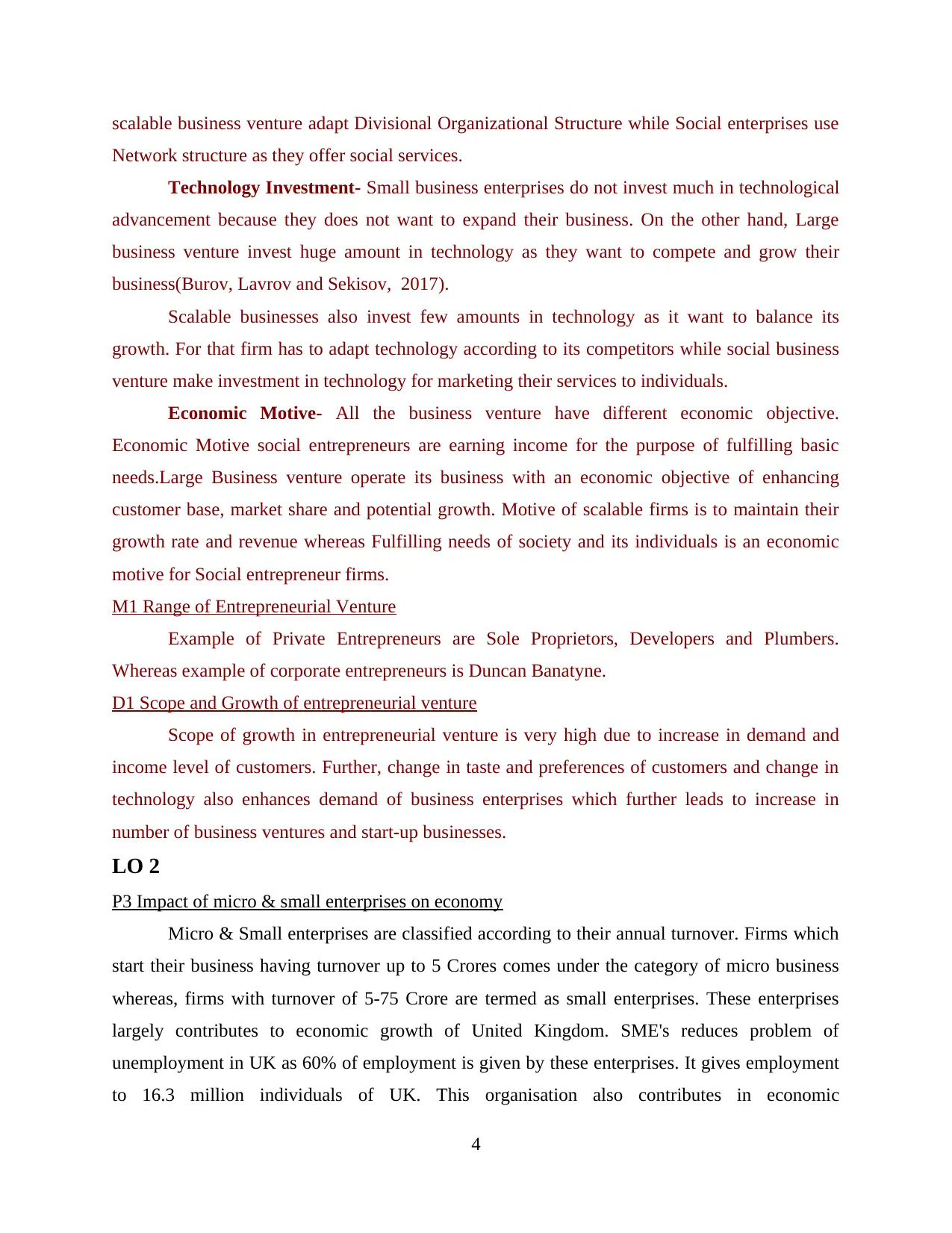
scalable business venture adapt Divisional Organizational Structure while Social enterprises use
Network structure as they offer social services.
Technology Investment- Small business enterprises do not invest much in technological
advancement because they does not want to expand their business. On the other hand, Large
business venture invest huge amount in technology as they want to compete and grow their
business(Burov, Lavrov and Sekisov, 2017).
Scalable businesses also invest few amounts in technology as it want to balance its
growth. For that firm has to adapt technology according to its competitors while social business
venture make investment in technology for marketing their services to individuals.
Economic Motive- All the business venture have different economic objective.
Economic Motive social entrepreneurs are earning income for the purpose of fulfilling basic
needs.Large Business venture operate its business with an economic objective of enhancing
customer base, market share and potential growth. Motive of scalable firms is to maintain their
growth rate and revenue whereas Fulfilling needs of society and its individuals is an economic
motive for Social entrepreneur firms.
M1 Range of Entrepreneurial Venture
Example of Private Entrepreneurs are Sole Proprietors, Developers and Plumbers.
Whereas example of corporate entrepreneurs is Duncan Banatyne.
D1 Scope and Growth of entrepreneurial venture
Scope of growth in entrepreneurial venture is very high due to increase in demand and
income level of customers. Further, change in taste and preferences of customers and change in
technology also enhances demand of business enterprises which further leads to increase in
number of business ventures and start-up businesses.
LO 2
P3 Impact of micro & small enterprises on economy
Micro & Small enterprises are classified according to their annual turnover. Firms which
start their business having turnover up to 5 Crores comes under the category of micro business
whereas, firms with turnover of 5-75 Crore are termed as small enterprises. These enterprises
largely contributes to economic growth of United Kingdom. SME's reduces problem of
unemployment in UK as 60% of employment is given by these enterprises. It gives employment
to 16.3 million individuals of UK. This organisation also contributes in economic
4
Network structure as they offer social services.
Technology Investment- Small business enterprises do not invest much in technological
advancement because they does not want to expand their business. On the other hand, Large
business venture invest huge amount in technology as they want to compete and grow their
business(Burov, Lavrov and Sekisov, 2017).
Scalable businesses also invest few amounts in technology as it want to balance its
growth. For that firm has to adapt technology according to its competitors while social business
venture make investment in technology for marketing their services to individuals.
Economic Motive- All the business venture have different economic objective.
Economic Motive social entrepreneurs are earning income for the purpose of fulfilling basic
needs.Large Business venture operate its business with an economic objective of enhancing
customer base, market share and potential growth. Motive of scalable firms is to maintain their
growth rate and revenue whereas Fulfilling needs of society and its individuals is an economic
motive for Social entrepreneur firms.
M1 Range of Entrepreneurial Venture
Example of Private Entrepreneurs are Sole Proprietors, Developers and Plumbers.
Whereas example of corporate entrepreneurs is Duncan Banatyne.
D1 Scope and Growth of entrepreneurial venture
Scope of growth in entrepreneurial venture is very high due to increase in demand and
income level of customers. Further, change in taste and preferences of customers and change in
technology also enhances demand of business enterprises which further leads to increase in
number of business ventures and start-up businesses.
LO 2
P3 Impact of micro & small enterprises on economy
Micro & Small enterprises are classified according to their annual turnover. Firms which
start their business having turnover up to 5 Crores comes under the category of micro business
whereas, firms with turnover of 5-75 Crore are termed as small enterprises. These enterprises
largely contributes to economic growth of United Kingdom. SME's reduces problem of
unemployment in UK as 60% of employment is given by these enterprises. It gives employment
to 16.3 million individuals of UK. This organisation also contributes in economic
4
⊘ This is a preview!⊘
Do you want full access?
Subscribe today to unlock all pages.

Trusted by 1+ million students worldwide
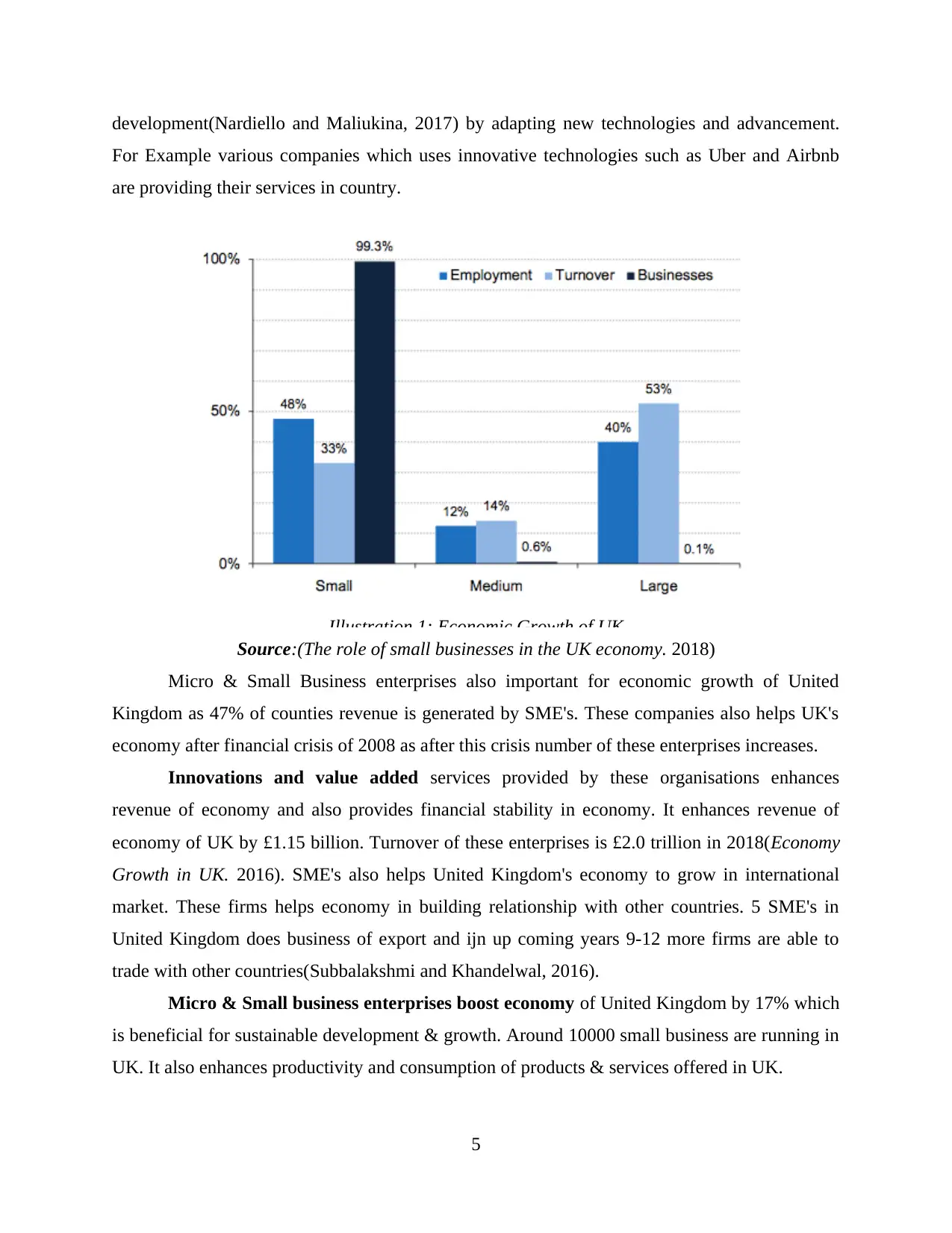
development(Nardіello and Malіukіna, 2017) by adapting new technologies and advancement.
For Example various companies which uses innovative technologies such as Uber and Airbnb
are providing their services in country.
Source:(The role of small businesses in the UK economy. 2018)
Micro & Small Business enterprises also important for economic growth of United
Kingdom as 47% of counties revenue is generated by SME's. These companies also helps UK's
economy after financial crisis of 2008 as after this crisis number of these enterprises increases.
Innovations and value added services provided by these organisations enhances
revenue of economy and also provides financial stability in economy. It enhances revenue of
economy of UK by £1.15 billion. Turnover of these enterprises is £2.0 trillion in 2018(Economy
Growth in UK. 2016). SME's also helps United Kingdom's economy to grow in international
market. These firms helps economy in building relationship with other countries. 5 SME's in
United Kingdom does business of export and ijn up coming years 9-12 more firms are able to
trade with other countries(Subbalakshmi and Khandelwal, 2016).
Micro & Small business enterprises boost economy of United Kingdom by 17% which
is beneficial for sustainable development & growth. Around 10000 small business are running in
UK. It also enhances productivity and consumption of products & services offered in UK.
5
Illustration 1: Economic Growth of UK
For Example various companies which uses innovative technologies such as Uber and Airbnb
are providing their services in country.
Source:(The role of small businesses in the UK economy. 2018)
Micro & Small Business enterprises also important for economic growth of United
Kingdom as 47% of counties revenue is generated by SME's. These companies also helps UK's
economy after financial crisis of 2008 as after this crisis number of these enterprises increases.
Innovations and value added services provided by these organisations enhances
revenue of economy and also provides financial stability in economy. It enhances revenue of
economy of UK by £1.15 billion. Turnover of these enterprises is £2.0 trillion in 2018(Economy
Growth in UK. 2016). SME's also helps United Kingdom's economy to grow in international
market. These firms helps economy in building relationship with other countries. 5 SME's in
United Kingdom does business of export and ijn up coming years 9-12 more firms are able to
trade with other countries(Subbalakshmi and Khandelwal, 2016).
Micro & Small business enterprises boost economy of United Kingdom by 17% which
is beneficial for sustainable development & growth. Around 10000 small business are running in
UK. It also enhances productivity and consumption of products & services offered in UK.
5
Illustration 1: Economic Growth of UK
Paraphrase This Document
Need a fresh take? Get an instant paraphrase of this document with our AI Paraphraser
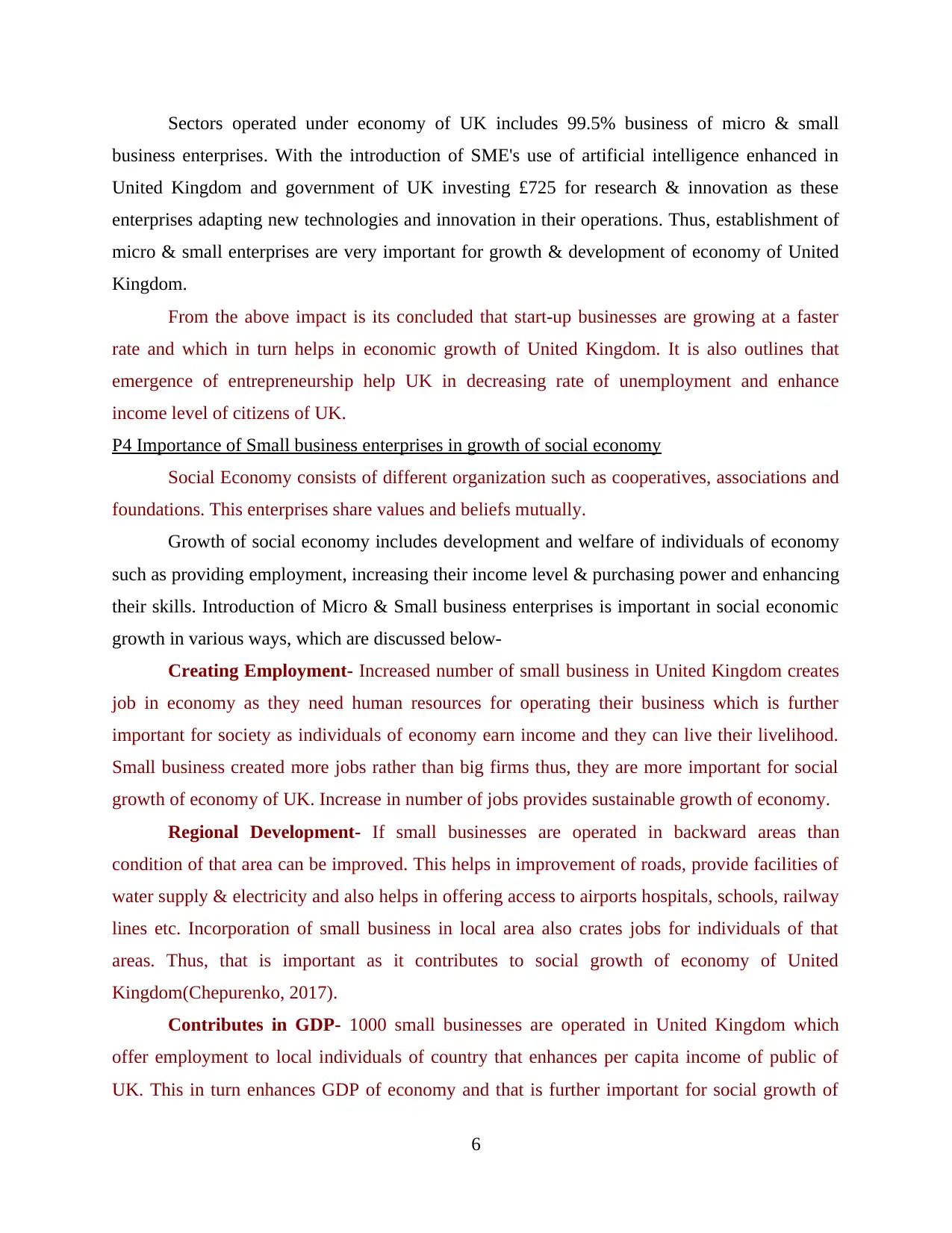
Sectors operated under economy of UK includes 99.5% business of micro & small
business enterprises. With the introduction of SME's use of artificial intelligence enhanced in
United Kingdom and government of UK investing £725 for research & innovation as these
enterprises adapting new technologies and innovation in their operations. Thus, establishment of
micro & small enterprises are very important for growth & development of economy of United
Kingdom.
From the above impact is its concluded that start-up businesses are growing at a faster
rate and which in turn helps in economic growth of United Kingdom. It is also outlines that
emergence of entrepreneurship help UK in decreasing rate of unemployment and enhance
income level of citizens of UK.
P4 Importance of Small business enterprises in growth of social economy
Social Economy consists of different organization such as cooperatives, associations and
foundations. This enterprises share values and beliefs mutually.
Growth of social economy includes development and welfare of individuals of economy
such as providing employment, increasing their income level & purchasing power and enhancing
their skills. Introduction of Micro & Small business enterprises is important in social economic
growth in various ways, which are discussed below-
Creating Employment- Increased number of small business in United Kingdom creates
job in economy as they need human resources for operating their business which is further
important for society as individuals of economy earn income and they can live their livelihood.
Small business created more jobs rather than big firms thus, they are more important for social
growth of economy of UK. Increase in number of jobs provides sustainable growth of economy.
Regional Development- If small businesses are operated in backward areas than
condition of that area can be improved. This helps in improvement of roads, provide facilities of
water supply & electricity and also helps in offering access to airports hospitals, schools, railway
lines etc. Incorporation of small business in local area also crates jobs for individuals of that
areas. Thus, that is important as it contributes to social growth of economy of United
Kingdom(Chepurenko, 2017).
Contributes in GDP- 1000 small businesses are operated in United Kingdom which
offer employment to local individuals of country that enhances per capita income of public of
UK. This in turn enhances GDP of economy and that is further important for social growth of
6
business enterprises. With the introduction of SME's use of artificial intelligence enhanced in
United Kingdom and government of UK investing £725 for research & innovation as these
enterprises adapting new technologies and innovation in their operations. Thus, establishment of
micro & small enterprises are very important for growth & development of economy of United
Kingdom.
From the above impact is its concluded that start-up businesses are growing at a faster
rate and which in turn helps in economic growth of United Kingdom. It is also outlines that
emergence of entrepreneurship help UK in decreasing rate of unemployment and enhance
income level of citizens of UK.
P4 Importance of Small business enterprises in growth of social economy
Social Economy consists of different organization such as cooperatives, associations and
foundations. This enterprises share values and beliefs mutually.
Growth of social economy includes development and welfare of individuals of economy
such as providing employment, increasing their income level & purchasing power and enhancing
their skills. Introduction of Micro & Small business enterprises is important in social economic
growth in various ways, which are discussed below-
Creating Employment- Increased number of small business in United Kingdom creates
job in economy as they need human resources for operating their business which is further
important for society as individuals of economy earn income and they can live their livelihood.
Small business created more jobs rather than big firms thus, they are more important for social
growth of economy of UK. Increase in number of jobs provides sustainable growth of economy.
Regional Development- If small businesses are operated in backward areas than
condition of that area can be improved. This helps in improvement of roads, provide facilities of
water supply & electricity and also helps in offering access to airports hospitals, schools, railway
lines etc. Incorporation of small business in local area also crates jobs for individuals of that
areas. Thus, that is important as it contributes to social growth of economy of United
Kingdom(Chepurenko, 2017).
Contributes in GDP- 1000 small businesses are operated in United Kingdom which
offer employment to local individuals of country that enhances per capita income of public of
UK. This in turn enhances GDP of economy and that is further important for social growth of
6
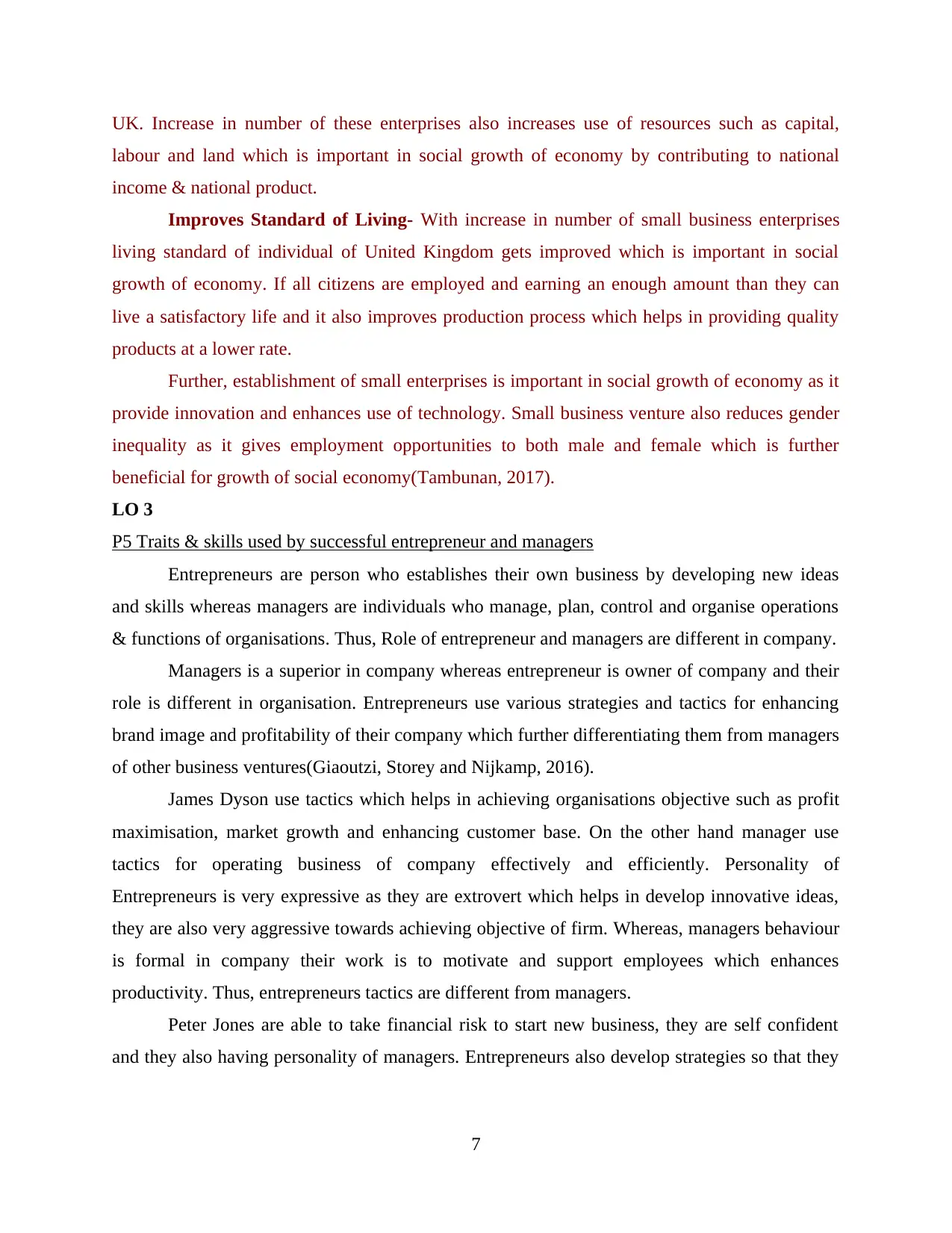
UK. Increase in number of these enterprises also increases use of resources such as capital,
labour and land which is important in social growth of economy by contributing to national
income & national product.
Improves Standard of Living- With increase in number of small business enterprises
living standard of individual of United Kingdom gets improved which is important in social
growth of economy. If all citizens are employed and earning an enough amount than they can
live a satisfactory life and it also improves production process which helps in providing quality
products at a lower rate.
Further, establishment of small enterprises is important in social growth of economy as it
provide innovation and enhances use of technology. Small business venture also reduces gender
inequality as it gives employment opportunities to both male and female which is further
beneficial for growth of social economy(Tambunan, 2017).
LO 3
P5 Traits & skills used by successful entrepreneur and managers
Entrepreneurs are person who establishes their own business by developing new ideas
and skills whereas managers are individuals who manage, plan, control and organise operations
& functions of organisations. Thus, Role of entrepreneur and managers are different in company.
Managers is a superior in company whereas entrepreneur is owner of company and their
role is different in organisation. Entrepreneurs use various strategies and tactics for enhancing
brand image and profitability of their company which further differentiating them from managers
of other business ventures(Giaoutzi, Storey and Nijkamp, 2016).
James Dyson use tactics which helps in achieving organisations objective such as profit
maximisation, market growth and enhancing customer base. On the other hand manager use
tactics for operating business of company effectively and efficiently. Personality of
Entrepreneurs is very expressive as they are extrovert which helps in develop innovative ideas,
they are also very aggressive towards achieving objective of firm. Whereas, managers behaviour
is formal in company their work is to motivate and support employees which enhances
productivity. Thus, entrepreneurs tactics are different from managers.
Peter Jones are able to take financial risk to start new business, they are self confident
and they also having personality of managers. Entrepreneurs also develop strategies so that they
7
labour and land which is important in social growth of economy by contributing to national
income & national product.
Improves Standard of Living- With increase in number of small business enterprises
living standard of individual of United Kingdom gets improved which is important in social
growth of economy. If all citizens are employed and earning an enough amount than they can
live a satisfactory life and it also improves production process which helps in providing quality
products at a lower rate.
Further, establishment of small enterprises is important in social growth of economy as it
provide innovation and enhances use of technology. Small business venture also reduces gender
inequality as it gives employment opportunities to both male and female which is further
beneficial for growth of social economy(Tambunan, 2017).
LO 3
P5 Traits & skills used by successful entrepreneur and managers
Entrepreneurs are person who establishes their own business by developing new ideas
and skills whereas managers are individuals who manage, plan, control and organise operations
& functions of organisations. Thus, Role of entrepreneur and managers are different in company.
Managers is a superior in company whereas entrepreneur is owner of company and their
role is different in organisation. Entrepreneurs use various strategies and tactics for enhancing
brand image and profitability of their company which further differentiating them from managers
of other business ventures(Giaoutzi, Storey and Nijkamp, 2016).
James Dyson use tactics which helps in achieving organisations objective such as profit
maximisation, market growth and enhancing customer base. On the other hand manager use
tactics for operating business of company effectively and efficiently. Personality of
Entrepreneurs is very expressive as they are extrovert which helps in develop innovative ideas,
they are also very aggressive towards achieving objective of firm. Whereas, managers behaviour
is formal in company their work is to motivate and support employees which enhances
productivity. Thus, entrepreneurs tactics are different from managers.
Peter Jones are able to take financial risk to start new business, they are self confident
and they also having personality of managers. Entrepreneurs also develop strategies so that they
7
⊘ This is a preview!⊘
Do you want full access?
Subscribe today to unlock all pages.

Trusted by 1+ million students worldwide
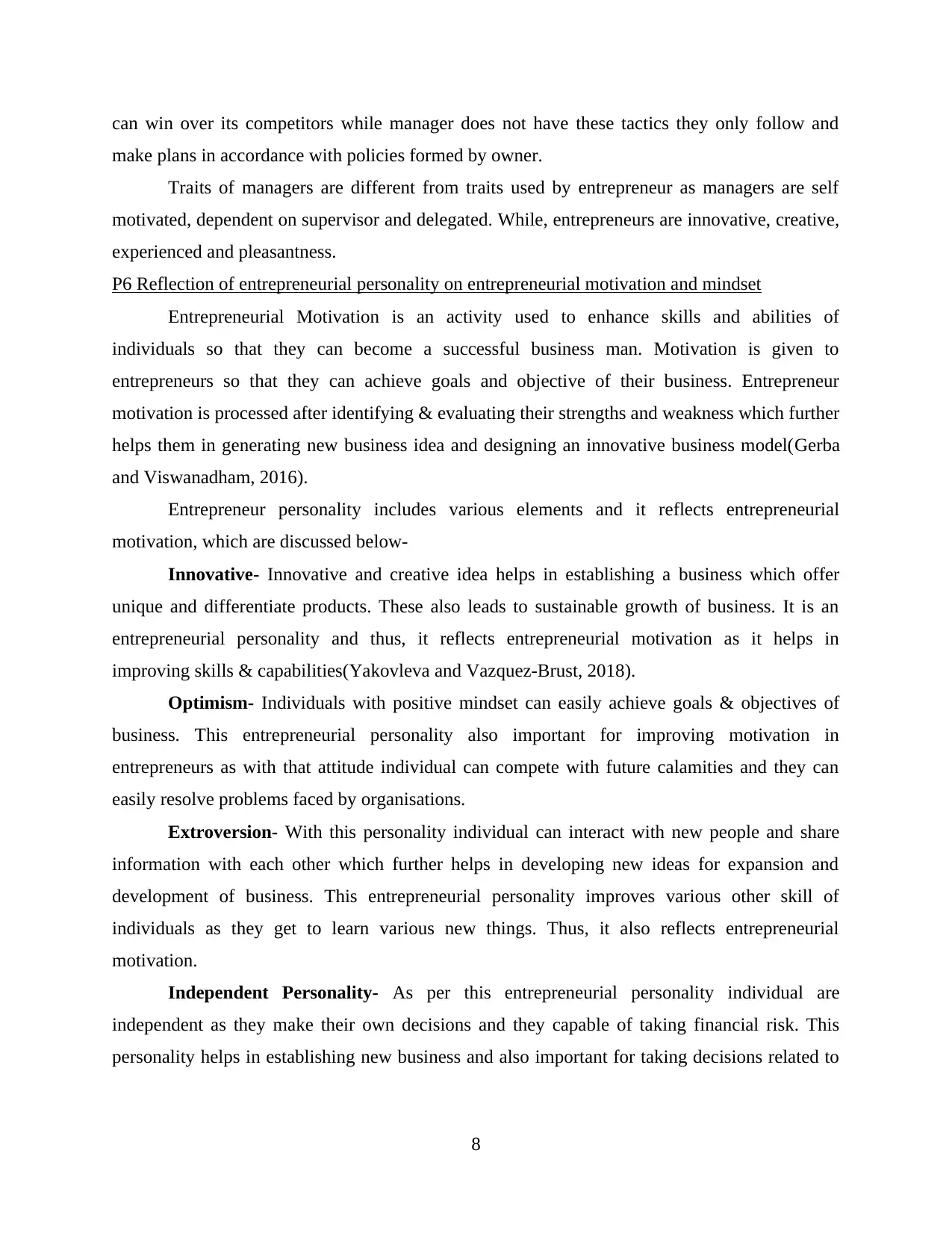
can win over its competitors while manager does not have these tactics they only follow and
make plans in accordance with policies formed by owner.
Traits of managers are different from traits used by entrepreneur as managers are self
motivated, dependent on supervisor and delegated. While, entrepreneurs are innovative, creative,
experienced and pleasantness.
P6 Reflection of entrepreneurial personality on entrepreneurial motivation and mindset
Entrepreneurial Motivation is an activity used to enhance skills and abilities of
individuals so that they can become a successful business man. Motivation is given to
entrepreneurs so that they can achieve goals and objective of their business. Entrepreneur
motivation is processed after identifying & evaluating their strengths and weakness which further
helps them in generating new business idea and designing an innovative business model(Gerba
and Viswanadham, 2016).
Entrepreneur personality includes various elements and it reflects entrepreneurial
motivation, which are discussed below-
Innovative- Innovative and creative idea helps in establishing a business which offer
unique and differentiate products. These also leads to sustainable growth of business. It is an
entrepreneurial personality and thus, it reflects entrepreneurial motivation as it helps in
improving skills & capabilities(Yakovleva and Vazquez-Brust, 2018).
Optimism- Individuals with positive mindset can easily achieve goals & objectives of
business. This entrepreneurial personality also important for improving motivation in
entrepreneurs as with that attitude individual can compete with future calamities and they can
easily resolve problems faced by organisations.
Extroversion- With this personality individual can interact with new people and share
information with each other which further helps in developing new ideas for expansion and
development of business. This entrepreneurial personality improves various other skill of
individuals as they get to learn various new things. Thus, it also reflects entrepreneurial
motivation.
Independent Personality- As per this entrepreneurial personality individual are
independent as they make their own decisions and they capable of taking financial risk. This
personality helps in establishing new business and also important for taking decisions related to
8
make plans in accordance with policies formed by owner.
Traits of managers are different from traits used by entrepreneur as managers are self
motivated, dependent on supervisor and delegated. While, entrepreneurs are innovative, creative,
experienced and pleasantness.
P6 Reflection of entrepreneurial personality on entrepreneurial motivation and mindset
Entrepreneurial Motivation is an activity used to enhance skills and abilities of
individuals so that they can become a successful business man. Motivation is given to
entrepreneurs so that they can achieve goals and objective of their business. Entrepreneur
motivation is processed after identifying & evaluating their strengths and weakness which further
helps them in generating new business idea and designing an innovative business model(Gerba
and Viswanadham, 2016).
Entrepreneur personality includes various elements and it reflects entrepreneurial
motivation, which are discussed below-
Innovative- Innovative and creative idea helps in establishing a business which offer
unique and differentiate products. These also leads to sustainable growth of business. It is an
entrepreneurial personality and thus, it reflects entrepreneurial motivation as it helps in
improving skills & capabilities(Yakovleva and Vazquez-Brust, 2018).
Optimism- Individuals with positive mindset can easily achieve goals & objectives of
business. This entrepreneurial personality also important for improving motivation in
entrepreneurs as with that attitude individual can compete with future calamities and they can
easily resolve problems faced by organisations.
Extroversion- With this personality individual can interact with new people and share
information with each other which further helps in developing new ideas for expansion and
development of business. This entrepreneurial personality improves various other skill of
individuals as they get to learn various new things. Thus, it also reflects entrepreneurial
motivation.
Independent Personality- As per this entrepreneurial personality individual are
independent as they make their own decisions and they capable of taking financial risk. This
personality helps in establishing new business and also important for taking decisions related to
8
Paraphrase This Document
Need a fresh take? Get an instant paraphrase of this document with our AI Paraphraser
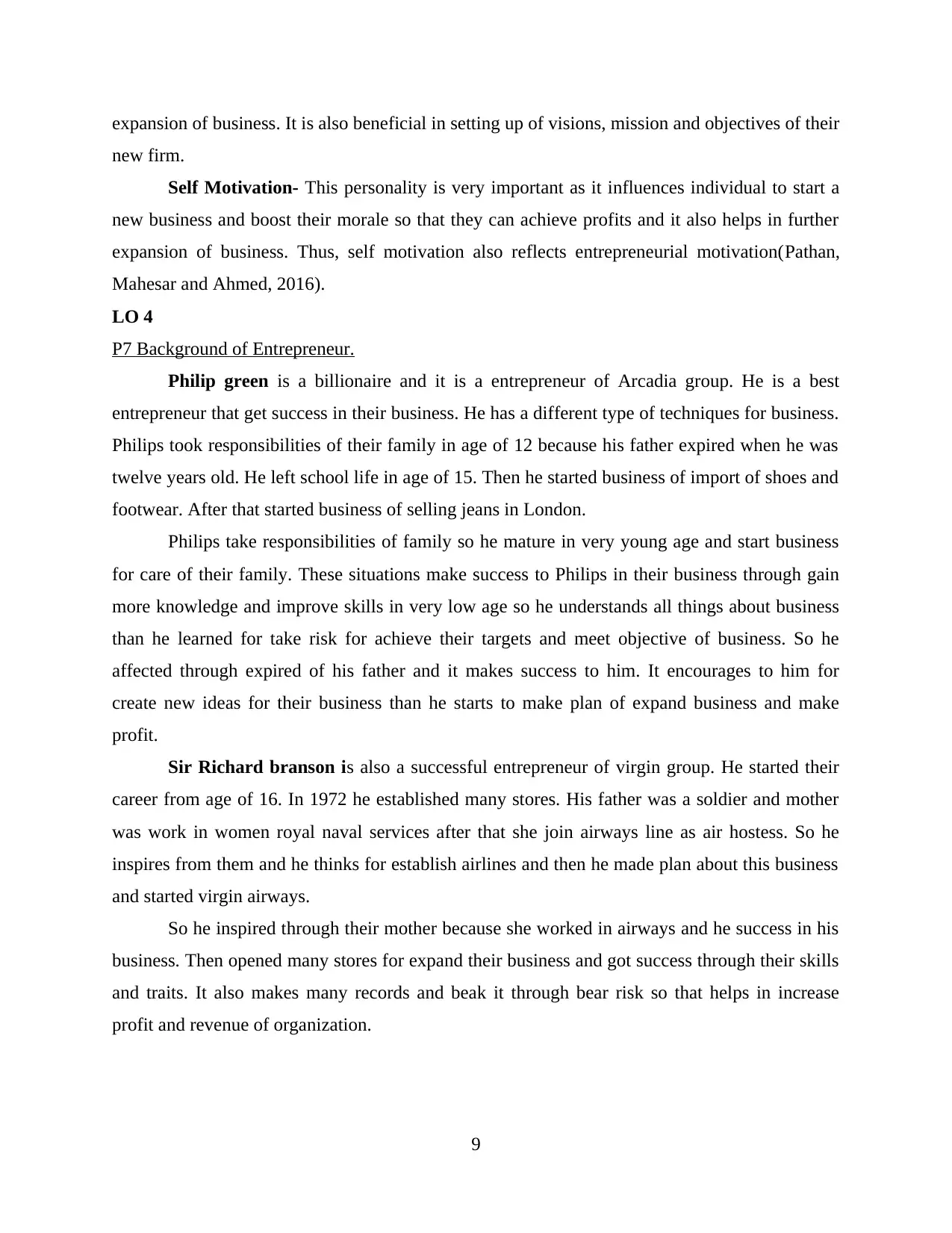
expansion of business. It is also beneficial in setting up of visions, mission and objectives of their
new firm.
Self Motivation- This personality is very important as it influences individual to start a
new business and boost their morale so that they can achieve profits and it also helps in further
expansion of business. Thus, self motivation also reflects entrepreneurial motivation(Pathan,
Mahesar and Ahmed, 2016).
LO 4
P7 Background of Entrepreneur.
Philip green is a billionaire and it is a entrepreneur of Arcadia group. He is a best
entrepreneur that get success in their business. He has a different type of techniques for business.
Philips took responsibilities of their family in age of 12 because his father expired when he was
twelve years old. He left school life in age of 15. Then he started business of import of shoes and
footwear. After that started business of selling jeans in London.
Philips take responsibilities of family so he mature in very young age and start business
for care of their family. These situations make success to Philips in their business through gain
more knowledge and improve skills in very low age so he understands all things about business
than he learned for take risk for achieve their targets and meet objective of business. So he
affected through expired of his father and it makes success to him. It encourages to him for
create new ideas for their business than he starts to make plan of expand business and make
profit.
Sir Richard branson is also a successful entrepreneur of virgin group. He started their
career from age of 16. In 1972 he established many stores. His father was a soldier and mother
was work in women royal naval services after that she join airways line as air hostess. So he
inspires from them and he thinks for establish airlines and then he made plan about this business
and started virgin airways.
So he inspired through their mother because she worked in airways and he success in his
business. Then opened many stores for expand their business and got success through their skills
and traits. It also makes many records and beak it through bear risk so that helps in increase
profit and revenue of organization.
9
new firm.
Self Motivation- This personality is very important as it influences individual to start a
new business and boost their morale so that they can achieve profits and it also helps in further
expansion of business. Thus, self motivation also reflects entrepreneurial motivation(Pathan,
Mahesar and Ahmed, 2016).
LO 4
P7 Background of Entrepreneur.
Philip green is a billionaire and it is a entrepreneur of Arcadia group. He is a best
entrepreneur that get success in their business. He has a different type of techniques for business.
Philips took responsibilities of their family in age of 12 because his father expired when he was
twelve years old. He left school life in age of 15. Then he started business of import of shoes and
footwear. After that started business of selling jeans in London.
Philips take responsibilities of family so he mature in very young age and start business
for care of their family. These situations make success to Philips in their business through gain
more knowledge and improve skills in very low age so he understands all things about business
than he learned for take risk for achieve their targets and meet objective of business. So he
affected through expired of his father and it makes success to him. It encourages to him for
create new ideas for their business than he starts to make plan of expand business and make
profit.
Sir Richard branson is also a successful entrepreneur of virgin group. He started their
career from age of 16. In 1972 he established many stores. His father was a soldier and mother
was work in women royal naval services after that she join airways line as air hostess. So he
inspires from them and he thinks for establish airlines and then he made plan about this business
and started virgin airways.
So he inspired through their mother because she worked in airways and he success in his
business. Then opened many stores for expand their business and got success through their skills
and traits. It also makes many records and beak it through bear risk so that helps in increase
profit and revenue of organization.
9

CONCLUSION
From above study, it has been summarized that entrepreneur is main character of
organization because it creates many new ideas and take risk for success of business.
Entrepreneur ventures present in business according to their size and structure. Small and micro
business play vital role in UK and increase growth of economy. Skills and traits of entrepreneurs
also helps in success of business and helps in expand.
10
From above study, it has been summarized that entrepreneur is main character of
organization because it creates many new ideas and take risk for success of business.
Entrepreneur ventures present in business according to their size and structure. Small and micro
business play vital role in UK and increase growth of economy. Skills and traits of entrepreneurs
also helps in success of business and helps in expand.
10
⊘ This is a preview!⊘
Do you want full access?
Subscribe today to unlock all pages.

Trusted by 1+ million students worldwide
1 out of 14
Related Documents
Your All-in-One AI-Powered Toolkit for Academic Success.
+13062052269
info@desklib.com
Available 24*7 on WhatsApp / Email
![[object Object]](/_next/static/media/star-bottom.7253800d.svg)
Unlock your academic potential
Copyright © 2020–2026 A2Z Services. All Rights Reserved. Developed and managed by ZUCOL.





